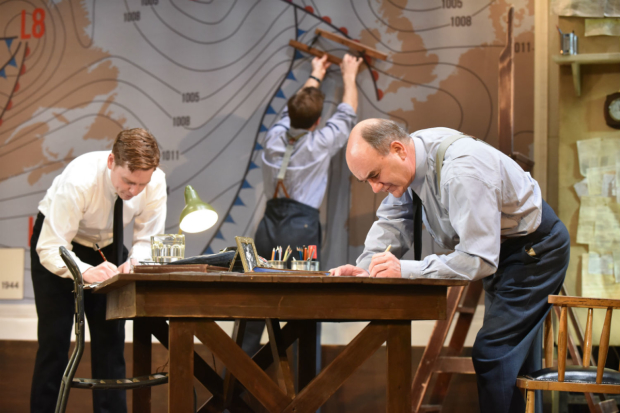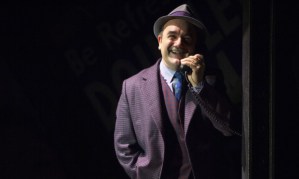Review: Pressure (Park Theatre)
David Haig’s meteorological D-Day thriller is a burst of sunshine

© Robert Day
The pleasure of a good yarn well-told is an elemental ingredient of theatre. And David Haig‘s play about the little-known but vital role of weathermen in the run up to D-Day is a cracker.
Of course, if you remember the actual date of the Allied invasion of Normandy then you know roughly what is about to happen from the outset. But the play and John Dove’s fleet-footed production encourage a willing suspension of disbelief. This utterly engrossing drama has arrived at the Park Theatre, after a premiere in Edinburgh, a run at the Chichester Festival and a nationwide tour; its just-announced West End transfer to coincide with the actual anniversary of the events it uses as its raw material is well-deserved.
Haig himself plays Dr James Stagg, a crack Scottish meteorologist seconded to Southwick House, in Portsmouth, Supreme Headquarters of the Allied Expeditionary Force. The play begins with his arrival on June 2 1944, and rolls forward in chunks of time measured by the weather maps he is using to give General Eisenhower an accurate forecast. On his words rest the fate of the massive undertaking.
The problem is that Stagg’s gloomy prediction of imminent storms, unprecedented for the time of year – based on a combination of sophisticated science and strong instinct – stands in dark contrast to the blithe belief of the American expert Irving Krick – whose main claim to fame is that he promised good weather for the shooting of Gone With the Wind – that the channel will be bathed in calm sunshine.
Battle is joined over isobars and weather fronts; storms circle, and not just on the map. Drama is conjured out of endless figures and instrument readings that are as difficult to read as arcane code. Stagg’s stress levels rise to stratospheric, not helped by the fact that his wife is about to give birth in a nearby hospital and he fears for her life.
Haig has made his career out of playing exactly this type of harried decency, and he has written himself a part that he fills with distinction. His performance catches a man just about holding himself together, acting according to his conscience and his intelligence, at some personal cost.
But what’s wonderful about the play he has fashioned is how funny it is – and how rich. His conversations with Eisenhower, played by Malcolm Sinclair with towering authority and a twinkling eye, are peppered with humour as each tries to explain to the other his country’s peculiar practices and conditions. But they also encompass other themes: the value of an individual life over the many, the cost of war, the difficulties of making judgements and standing by them.
Unostentaiously and with a quiet intensity, Pressure covers a lot of ground without ever resorting to patriotic cliché. Only towards the end, when Haig perhaps tries to pack too much in, does it slightly slacken its grip.
Dove’s production is direct and lively, good at catching the bustle of a room where men are constantly interrupted with the latest developments in the weather and in the battle. Colin Richmond’s set is dominated by a series of huge weather maps that become as hypnotic to us in the audience as they are to Stagg himself. It is simple but effective.
The performances too have a pared-back and restrained quality. As the only woman in the cast, Laura Rogers is outstanding, beautifully capturing the quiet agony of someone for whom the war has brought love as well as suffering and who knows that its conclusion will alter her life for the worse. And Bert Seymour makes a lovely theatrical debut as Andrew, the weatherman who never doubts Stagg’s judgement. The moment when he congratulates him on being right, is oddly moving. It’s a quality shared by this unpredictable sunburst of a play.
Pressure runs at the Park Theatre until 28 April and transfers to the Ambassadors Theatre from 6 June to 1 September.

















